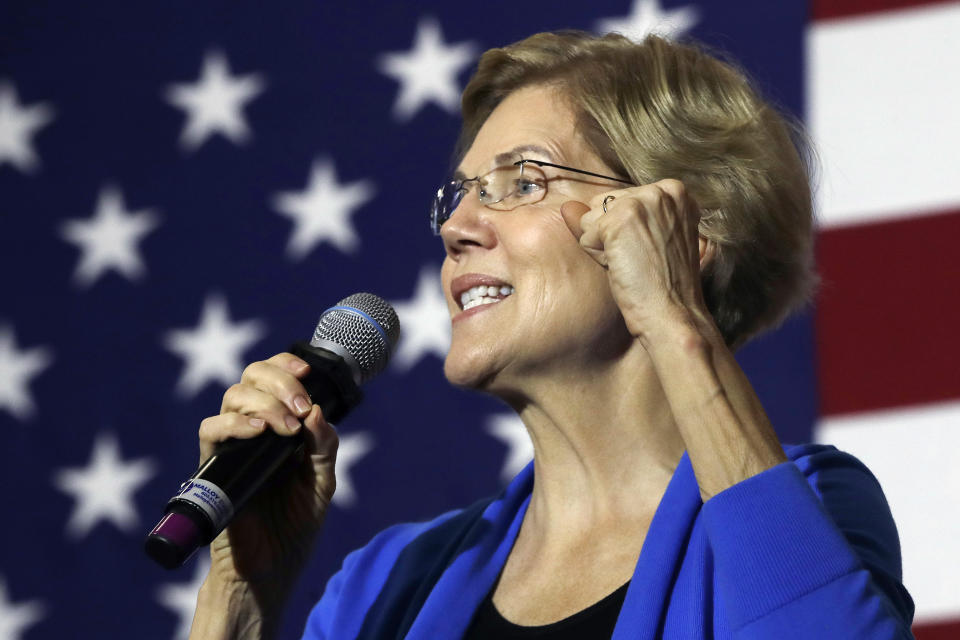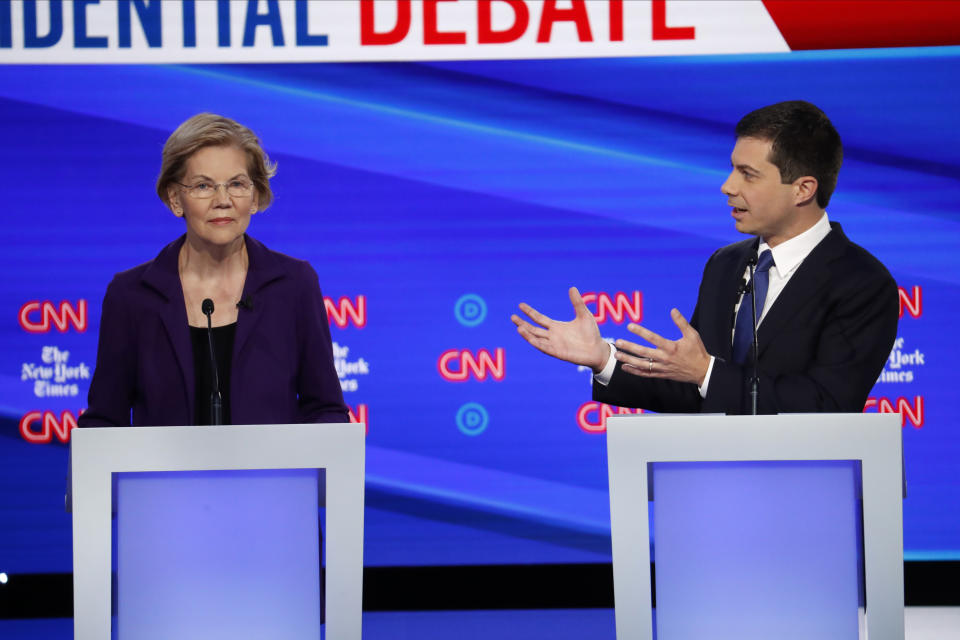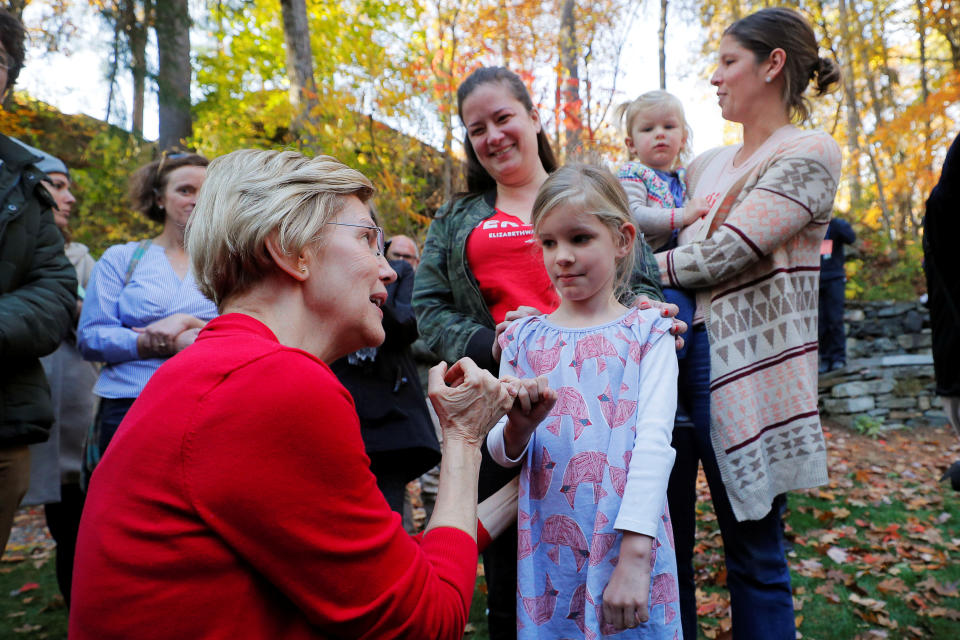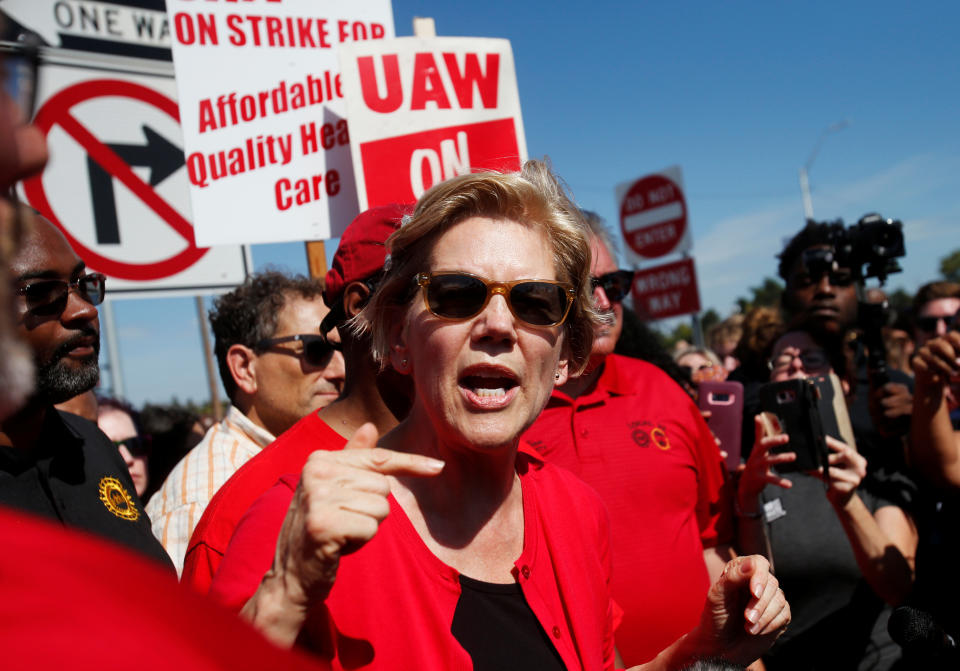Dems worry Warren is too far left to beat Trump. Does she have a plan for that?
She survived a Shaky Debut. She engineered a Slow and Steady Comeback. She eventually emerged as a Frontrunner. And now, having pulled ahead of her rivals in Iowa, New Hampshire and many national polls, Elizabeth Warren has entered a new phase of her presidential campaign: the Part Where Democrats Start to Get Second Thoughts.
It’s proving to be the biggest test of her candidacy to date: a challenge to her so-called electability that could prevent her from advancing to the general election and getting the chance to prove her critics wrong.
At the primary debate earlier this month in Westerville, Ohio, Warren was assaulted from all sides. Beto O’Rourke accused her of “pitting [one] part of the country against the other.” Amy Klobuchar dismissed her agenda as a “pipe dream.” And Pete Buttigieg mocked her refusal to say whether middle-class taxes would have to go up to fund her single-payer Medicare for All health plan.
“A yes-or-no question that didn’t get a yes-or-no answer,” Buttigieg snapped. “Your signature, senator, is to have a plan for everything — except this.”
Their goal was clear. Democratic voters spent the summer flirting with Warren. Now, as actual caucuses and primaries approach, the time is coming to commit: to ask whether the left-wing senator from Massachusetts who keeps calling for “big, structural change” — the largest and most liberal reforms since the Great Depression — can actually deliver on Democrats’ top priority and defeat Donald Trump next November. Warren’s rivals are seeking to sow doubt about that question, arguing that her proposals are too impractical, her approach too divisive, her politics too extreme.

Voters may be paying attention. In a Quinnipiac University primary poll taken before the debate, 40 percent of respondents said Warren had the best policy ideas; only 30 percent said the same after the debate, her first substantial decline. Nationally, Warren’s polling average has fallen from a high of 26.6 percent earlier this month to 21.7 percent today; meanwhile, both Buttigieg and Sanders, whose bases overlap with Warren’s, have gained ground. A new poll even shows Buttigieg at 20 percent in Iowa, leapfrogging Sanders and Joe Biden for second place.
“The same thing happens every cycle,” said Joe Trippi, the veteran Democratic strategist who ran Howard Dean’s boom-and-bust campaign in 2004. “Candidates like Dean and Warren rise on the euphoria of how great and pure they are. Then everybody starts focusing on the downsides. ‘Wait a minute,’ they ask. ‘Are we really going to do this?’ And that’s when voters start to move to the John Kerrys of the world.”
Whether Democratic voters make that move — to Biden, or Buttigieg, or Klobuchar, or whomever — remains to be seen. But for Warren this is a make-or-break moment. With Sanders nipping at her heels, she can’t backtrack on big liberal promises like Medicare for All without risking her left flank or damaging her carefully crafted brand. But to maintain momentum, Warren must also convince sympathetic progressives to take a leap of faith — to believe, more than a year before the next election, that a candidate who doesn’t look or sound like any previous president has what it takes to win. Then she has to actually start winning the more moderate voters who can put her over the top in 2020.
Can she pull it off?

Doubts about Warren’s “electability” are nothing new. Google “Elizabeth Warren” and “electability” and you’ll get about 150,000 results. The earlier ones cite her clumsy attempt to counter Trump’s “Pocahontas” taunts with a DNA test proving her Native American heritage. Then, as Warren began to climb in the polls, observers noticed that her perceived electability numbers were improving as well. Some wondered whether “electability” had just been a cover for sexism all along.
The argument Warren’s rivals are making today, however — the one that appears to be resonating — sidesteps gender and instead targets the senator’s greatest strength: her “I’ve got a plan for that” brand of policy-forward progressivism.
“I think Warren is a deeply problematic candidate not because of who she is but because of the positions she’s taken,” said a Democrat close to the Buttigieg campaign who was not authorized to speak on the record about strategy. “She’s a particular kind of liberal who has boundless confidence in Washington bureaucracies to run things. That’s just profoundly different from Democrats who have held local office and seen Washington at its best and worst and don’t think Washington has all the answers.”
This is why Biden, Buttigieg, Klobuchar and others keep attacking Warren on Medicare for All. Every time she ducks the tax-hike issue and repeats only that overall health care “costs will go down” for the middle class, it’s not just an opportunity to call into question her authenticity. It’s a chance to force her to defend the larger governing approach that Medicare for All embodies — the idea that the best way to improve the system is by ending private insurance altogether.

“The political challenge is that you are forcing people off their plans whether they like it or not,” said the source close to the Buttigieg campaign, noting that both public and private polling tends to indicate that a public-option approach (like Buttigieg’s Medicare for All Who Want It) is far more popular than undiluted Medicare for All. “Our research shows that. I’m sure the other candidates’ research shows the same. Fundamentally, Warren is throwing Trump a lifeline. Instead of making the election a referendum on him, now he can say, ‘Yeah, even if you think I’m bad, I’m not going to take your Blue Shield card away.’”
Unions have also been wary of Medicare for All, another potential red flag for Warren as she angles for working-class votes. Doug Stern, a spokesman for the pro-Biden International Association of Firefighters, explained that the union’s members are loath to lose health plans they “diligently” negotiated for, which cover facilities that treat behavioral issues such as addiction and PTSD “uniquely from a firefighter’s perspective.”
“Under a one-size-fits-all single-payer system, that wouldn’t be an option,” Stern said. “We like where Biden is. Let us keep the plans we have and then have the option to choose whatever else is out there, like the Affordable Care Act or another public plan.”
And so Medicare for All has emerged as a major trial for Warren. Under pressure, she promised last week to explain how she would pay for a program that could cost more than $30 trillion over 10 years without raising middle-class taxes. Behind closed doors, her policy team is weighing various options: redirecting existing public health care spending; a premium charge that would go to the government rather than a private insurance company; a progressive “consumption tax” on goods and services.
Warren’s campaign says she will unveil her new plan before the next Democratic debate, on Nov. 20. The goal is “to figure out — with one go — how to stop the ‘How are you going to pay for it?’ question,” an outside economic adviser told the Washington Post. “She wants something airtight but easy to understand.”
But answering her “How are you going to pay for it?” critics with some clever math will only serve to reinforce Warren’s wonkiness. The real electability challenge is broader. According to a recent Kaiser Family Foundation poll, 58 percent of Americans oppose Medicare for All when they learn that it will eliminate private insurance. It’s not cost they’re worried about; it’s leaping into the unknown. Can Warren sell voters on a vision of government that goes well beyond what they’re currently comfortable with?

The irony here is that despite Warren’s left-wing reputation, she has been keeping one eye on her general election prospects ever since launching her primary campaign.
Talk to Warren’s team and they will emphasize the geographic, grassroots expansiveness of her effort — an advantage afforded, they say, by her refusal to hold big-dollar fundraisers. “We will compete and organize everywhere,” deputy communications director Chris Hayden told Yahoo News. “Because Elizabeth is not giving special access to rich people in exchange for contributions to her campaign means that she can build a grassroots movement by meeting with voters one at a time, face to face. She has already visited Alabama, California, Colorado, Georgia, Massachusetts, Tennessee, Texas, Utah, Virginia, Minnesota, Pennsylvania, Florida, Wisconsin, Michigan and more” —the largest list of red and purple states of any of the 2020 Democrats.
“Elizabeth is spending her time hearing from voters across the country and talking about why our government is not working for the people,” Hayden added. “That’s how we will build a grassroots movement to win in 2020 and make change come January 2021.”
Look more closely at Warren’s messaging, meanwhile, and it’s clear how conscious she has been of maintaining crossover appeal. Her entire stump speech — a folksy narrative that begins in her home state of Oklahoma with her working-class parents and Republican, Vietnam-vet brothers — is tailored to connect with precisely the sort of blue-collar heartland voters who swung from Obama to Trump in 2016. Whenever she’s asked about gun control, Warren eschews the emotional appeals of a Beto O’Rourke — “Hell, yes, we’re going to take your AR-15, your AK-47!” — in favor of a cool, calculated line that compares “gun violence” to “a national health emergency” and calls for the government to “double down on research.” Initially she resisted campaigning on Medicare for All despite cosponsoring Bernie Sanders’s 2017 Senate bill; in January, Warren identified “affordable health care for every American” as her goal and said that there were “different ways we can get there.” Deflecting questions about a tax hike was designed to deny the GOP a ready-made attack ad next fall.

In other words, Warren is (and always has been) more of politician and less of a purist than either her supporters or detractors might assume. With that in mind, it’s possible to imagine her pivoting yet again on Medicare for All. In 2017, Wisconsin Sen. Tammy Baldwin also cosponsored Sanders’s legislation; in 2018 she reframed her support as a “statement” of her “belief” that “our goal must be universal health care coverage for everyone” while emphasizing her plans to reduce prescription drug costs and lower the Medicare enrollment age to 55. Republicans attacked Baldwin for backing “a $32 trillion government takeover of the U.S. health care system that would kick every single American off the health care plans they know and like,” but she wound up winning reelection by 11 percentage points in a state that will likely decide the 2020 election.
Given that Democrats have no chance of securing the 60 or more Senate seats needed to pass Medicare for All — and given that Trump and the GOP are actively working to unravel Obamacare — strategists say that Warren could likely do the same thing next fall without suffering much blowback.
“When you’re running a campaign, you choose what you talk about,” said Ben Wikler, the chair of the Wisconsin Democratic Party. “And if Trump and the Republicans want the debate to be about health care, that’s a winning debate for Democrats.”
Warren herself has telegraphed this shift, to some extent. “It’s not that I have a plan that says we’re going to do this part and then we’re going to do this part,” she told the executive board of the International Longshore and Warehouse Union in a recently leaked video from Aug. 23. “We’re going to understand the urgency of the moment to get this solved with people who aren’t covered and get ourselves on a path where everybody can get there and everybody can get covered at the lowest possible cost.”
That process, she added, is “what Medicare for All is all about.”
Ultimately, the Warren camp argues that regardless of where their boss lands on Medicare for All, her plan is to focus on a message of progressive economic populism designed to function just as well in a general election as in a primary. They claim that her call to “fight” the “corruption” of a government that only “works for the wealthy and well connected” will both excite the Democratic base and sway former Democrats, many of them working-class whites, who tipped the 2016 election to Trump in states such as Wisconsin.

So far, the signals on that front are mixed. Anecdotally, it’s easy for reporters to travel to Lordstown, Ohio, and find disgruntled former GM employees who describe Warren as “just smoke and mirrors” while insisting that they “cannot vote for a socialist government.” It’s also easy for reporters to venture to Kermit, W.Va., and observe “at least a dozen supporters of the president — some wearing MAGA stickers — nodding their heads, at times even clapping,” for Warren.
The data is even more confusing. Warren’s electability numbers among Democrats have been rising; in October, about 20 percent of primary voters told Quinnipiac that she had the best chance of winning against Trump, up from about 10 percent in August. On the other hand, more than 40 percent of respondents said the same about Biden. In one-on-one matchups with the president, meanwhile, Warren almost always leads — yet both Biden and Sanders lead by a little more, on average. At the same time, a new Harvard study shows that Warren might be better positioned to win the Electoral College than any of her top-tier rivals due to her disproportionate support among Latinos. And so on, and so forth.
The truth is, until actual voters actually vote, nobody really knows what electability is — and who does or doesn’t have it.

That uncertainty, of course, will only encourage Warren’s rivals to keep sowing doubts. The source close to the Buttigieg campaign mentioned two additional areas for possible attacks: Warren’s recent vows to ban fracking and decriminalize border crossings, which are both fraught issues in Midwestern swing states.
“These sorts of things really matter to voters — not just as issues but in terms of how they think about your character,” said the Buttigieg source. “So if she’s willing to say and do anything to appeal to the left flank of the party, the question then becomes, ‘Do you want to take a massive risk with Warren or do you want to nominate someone who can win?’” (It’s worth noting that in the most recent Quinnipiac poll, only 2 percent of respondents said Buttigieg had the best chance of beating Trump.)
Warren, meanwhile, will keep trying to prove her opponents wrong — even if it may take until Feb. 3, the night of the Iowa caucuses.
“This happened to Obama too,” Joe Trippi recalled. “He started rising in the polls against Hillary Clinton, and that’s when the big doubts began: ‘Is the country ready for an African-American president?’ Then he won Iowa, and that really had a big psychological impact. People started to rethink their doubts.
“If Warren wins Iowa, which she certainly is in position to do, that helps her get over this electability thing,” Trippi concluded. “But I do think it’s a problem she has to deal with — for sure.”
Warren’s current fight over Medicare for All is the first step on that path. It won’t be the last.
Additional reporting by Hunter Walker and Jon Ward
Download the Yahoo News app to customize your experience.
Read more from Yahoo News:



